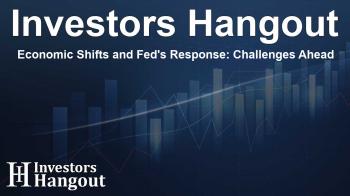Economic Shifts and Fed's Response: Challenges Ahead

Understanding the Federal Reserve's Challenges
The role of the Federal Reserve is intricate and dynamic, especially in a climate rife with uncertainties. Policymaking efforts reflect economic forecasts and real-time data, making their task uniquely challenging at present.
The Impact of Government Policies
Recent actions stemming from the White House may significantly influence economic predictions. Economists are now focusing on how these directives might shape the landscape for the Fed's strategies. Although President Trump has announced intentions to impose tariffs on neighboring countries, the market’s response remains to be fully seen.
Expert Opinions on Economic Trends
Torsten Sløk, an eminent economist, has highlighted strong economic indicators but expressed concerns about looming risks, such as layoffs potentially affecting unemployment rates and the hesitation in capital expenditures influenced by political instability.
Growth Outlook Amid Federal Layoffs
Countering such apprehensions, Stephanie Roth from Wolfe Research critiques the belief that federal employee reductions will heavily impact economic growth. She emphasizes that these layoffs will not singlehandedly precipitate a recession.
Tariffs and Monetary Policy Implications
The upcoming tariff implementations could create temporary inflationary pressure, a matter that might compel the Fed to adjust its policies accordingly. Despite these pressures, speculation indicates that the central bank will likely maintain its current target rate in the near future.
Market Reactions: Treasury Yields
The US 2-year Treasury yield behavior suggests that core policy measures are appropriate at the moment. This crucial indicator dropped to 4.18%, marking a notable decrease since December. Such trends indicate a generally dovish sentiment among investors regarding future Fed adjustments.
Evaluating the Current Monetary Stance
Models measuring Fed policy currently exhibit a slightly tight monetary stance. As new data comes to light, economists will need to gauge whether the Fed's existing approach aligns with changing economic conditions.
The Road Ahead: Monitoring Key Economic Data
The forthcoming release of PCE inflation figures will serve as a pivotal moment for assessing the Fed's position. While January's data showcased persistent inflation concerns, analysts predict a more moderate report this time around.
Adapting to Rapidly Changing Conditions
Given the rapid pace of political and economic shifts, the Fed faces crucial decisions. While analyzing prior data, they must be acutely aware of forthcoming tariff impacts, which will take time to fully influence the economy.
Final Thoughts on Future Fed Strategy
In navigating these challenges, the Federal Reserve must balance past indicators with new variables emerging from government movements. Their effectiveness depends not only on analyzing data but also on anticipating how external factors will interplay with economic trends.
Frequently Asked Questions
What role does the Federal Reserve play in the economy?
The Federal Reserve manages monetary policy to influence economic conditions, including inflation, employment, and economic growth.
How do government policies affect the Federal Reserve?
Government policies can create economic uncertainty, thereby impacting the Fed's monetary policy decisions in response to changing conditions.
What are the implications of tariffs on inflation?
Tariffs can lead to increased costs for goods, potentially causing a temporary rise in inflation rates, which the Fed must monitor closely.
How do economists predict the Fed's actions?
Economists analyze market trends, economic indicators, and political developments to gauge potential shifts in the Fed's policy stance.
Why is monitoring PCE inflation important for the Fed?
PCE inflation data helps the Fed assess whether its current policies align with inflation targets, guiding future monetary adjustments.
About The Author
Contact Ryan Hughes privately here. Or send an email with ATTN: Ryan Hughes as the subject to contact@investorshangout.com.
About Investors Hangout
Investors Hangout is a leading online stock forum for financial discussion and learning, offering a wide range of free tools and resources. It draws in traders of all levels, who exchange market knowledge, investigate trading tactics, and keep an eye on industry developments in real time. Featuring financial articles, stock message boards, quotes, charts, company profiles, and live news updates. Through cooperative learning and a wealth of informational resources, it helps users from novices creating their first portfolios to experts honing their techniques. Join Investors Hangout today: https://investorshangout.com/
The content of this article is based on factual, publicly available information and does not represent legal, financial, or investment advice. Investors Hangout does not offer financial advice, and the author is not a licensed financial advisor. Consult a qualified advisor before making any financial or investment decisions based on this article. This article should not be considered advice to purchase, sell, or hold any securities or other investments. If any of the material provided here is inaccurate, please contact us for corrections.

